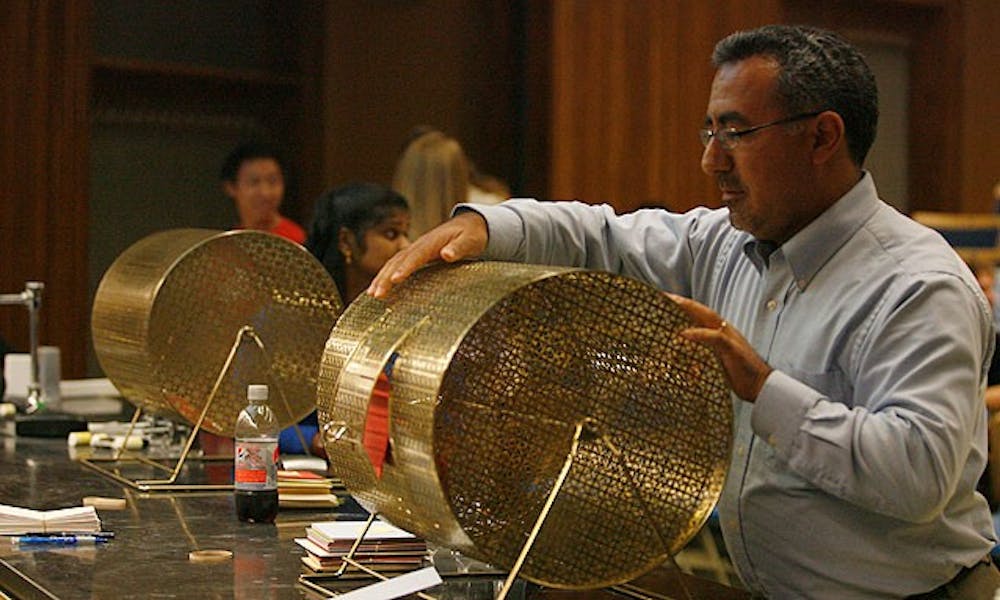The house model lottery was not without drama Wednesday night, as sororities, fraternities and non-greek selective living groups learned where they will live under the house model beginning Fall 2012.
All nine Panhellenic Association sororities will be housed on Central Campus next year, along with six fraternities and seven non-greek SLGs. The remaining 10 Interfraternity Council fraternities and 13 SLGs will be housed on West Campus. Housing assignments were determined by lottery within each size category. SLGs—including fraternities and sororities—cannot petition for different houses, though they can trade houses with administrative approval.
These assignments mean that Central is significantly more concentrated with selective groups than West. Twenty-three of the 51 houses on West are marked as selective and 22 of the 29 houses on Central are occupied by selective groups, according to a Housing, Dining and Residence Life document. This brings the total number of houses under the model to 80.
The logistics of the houses inevitably favor some groups over others, said Joe Gonzalez, associate dean for residence life.
“West does not have many extra-small and small houses,” he said. “There are four houses of this size, which was insufficient to meet the demand—seven groups of this size hoped to be on West.”
Gonzalez added that groups on Central could have an even greater potential to flourish on Central than affiliated houses.
IFC President Zach Prager, a senior, could not be reached for comment.
Following Friday’s announcement that Panhel chapters had been granted housing in the new residential model, there was debate over whether the chapters would elect to be split between Central and West campuses or decide to stay together on one campus, said Panhel President Jenny Ngo, a senior, adding that Panhel also considered pulling out of the housing model lottery.
Panhel could not split the chapters in a way that could be agreed upon and ended up being placed throughout Central Campus, she said.
“The Panhellenic community and its nine chapters officially entered this process under the condition that all nine chapters are located on one campus,” Ngo wrote in an email Wednesday. “Reasoning behind this included overall Panhellenic unity and equity across all chapters in terms of resources and opportunities.”
Some chapter members, however, were not happy about the prospect of living on Central. One sorority member left the auditorium Wednesday night in tears after she said her chapter would not be safe in its new location.
“Central gets a bad rap in terms of safety issues,” said Donna Lisker, associate dean of undergraduate education and co-chair of the House Model Committee. “We’re always interested in looking at lighting and bus routes and those things, and that will continue. We’ll work with the chief of police, we’ll work with all the people we need to work with to make people feel comfortable in their space.”
Ngo said she hopes Panhellenic women can change the tone of Central culture for the better.
“Panhellenic’s relationships with the rest of the Duke community will not be affected adversely [by moving to Central],” she said. “Having a ‘home base’ for each chapter will actually strengthen their partnerships across campus.”
Ngo noted that less than half of each chapter’s membership will live in its respective house, though all three classes will expect to be represented per house model policy.
The housing lottery was subject to frequent disruptions. One student, before drawing her SLG’s housing assignment, stopped to address Gonzalez, who also serves as co-chair of the House Model Committee, and said that SLGs with primarily Caucasian members were being favored in housing locations.
This is untrue, Gonzalez said. He later noted the positive aspects of the new house model, such as funding opportunities for each house.
“Right now, we think about the money going through the quad councils,” Lisker said. “If you’re in a house of 30 people, and you have control of your own money... that can make a big difference in how you think about your house life, your social life and your community.”
Thoughts of funding, however, are not positive for all groups. The entrepreneurship SLG, InCube, recently received a $25,000 private donation, which the group used to renovate its common room on West. InCube will be moving to Central next year.
“We are not happy with the assignment that we were given,” said InCube President Madeleine Clark, a sophomore. “When we did renovations, we were under the assumption that we would be able to keep [our housing]—no one had ever told us otherwise. We would have never invested the money.”
Although many students criticized the lottery, Lisker said the aims of the house model trump student frustration.
“We did our best to be fair to everybody,” Lisker said. “And sometimes that means that everybody is equally annoyed with you. Our goal was to keep our principles of equity and community in mind.”
Get The Chronicle straight to your inbox
Signup for our weekly newsletter. Cancel at any time.

